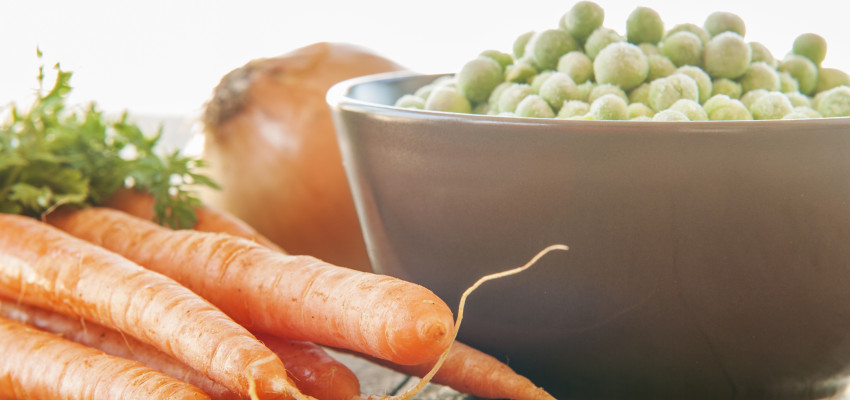By Cara Harbstreet on October 30, 2017
Canned vegetables vs frozen

Fresh vegetables are better than canned or frozen, right? Not so fast. There are clear advantages and disadvantages to using fresh, frozen and canned fruits and vegetables depending on your recipe, budget, timing and storage space. Let’s break down some of the considerations that go into food choices to help you make informed decisions as you fill your grocery cart.
TASTE
Flavor is king; this will never change. Regardless of the nutrition, cost and availability of a food, we simply want it to taste good. Fruits and vegetables taste their best when they’re at the peak of freshness. For those of us in the Midwest, this means spring through fall is a great time to choose fresh produce.
However, when produce isn’t in season it just doesn’t taste quite the same. Think of a store-bought tomato in January - not so appetizing, right? In this case, opting for canned is likely a better choice. The same goes for fruit, especially varieties that freeze well such as berries, tropical fruits and stone fruits.
NUTRITION
While some studies show small differences in the nutrition of fresh versus canned or frozen produce, the differences are negligible when taken in context of an overall dietary pattern. Most Americans fall short of the recommended five servings of fruit and vegetables every day.
So instead of worrying about those small differences, it’s better to choose things you enjoy and want to eat.
The biggest nutritional difference doesn’t come from the fruit or vegetable itself, but rather how it was packaged or processed. I recommend choosing canned fruit packed in water or its own juice, otherwise they sneak in added sugars. In addition to added sugar, sodium is another concern. Choose canned vegetables with a low sodium version or, better yet, no salt added.
COST
I don’t know about you, but I’m always on the hunt for a deal to keep my grocery costs low. Fresh produce in season can be a steal and I stock up on fruits and vegetables when the time is right. But other times of the year, it’s more affordable to opt for canned or frozen options instead. If you’re on a tight budget, don’t feel like you’re doing a disservice by skipping the fresh stuff - frozen and canned produce is just as versatile as fresh and is a great option for stretching your dollar at the grocery store.
SUSTAINABILITY & FOOD WASTE
Many people I’ve talked to are hesitant to choose frozen or canned fruits and vegetables because they classify them as “processed” foods. But I like to point out that all foods undergo some form of processing, and freezing and canning are methods of preserving foods to help them last longer and create less food waste. There’s a big difference between a bag of frozen strawberries and pre-packaged, frozen Toaster Strudels with strawberry filling.
Have you ever been gung-ho at the grocery store and gone a little crazy filling the cart with all sorts of fresh fruits and veggies? What happens when life gets busy, or you bought more than you needed? Yep, you guessed it. You end up with moldy berries, a liquified cucumber or rotting tomatoes on the kitchen counter. Fresh produce is a wonderful thing but doesn’t have nearly the same shelf life for storage once you get it home. To reduce wasted food (and money) consider buying fresh things for what you plan to use in the next several days, and frozen or canned for the rest of the time.
WHAT ARE YOU USING IT FOR?
Fresh produce not only tastes great but also looks great. We eat with our eyes so if you plan to prepare a dish with raw fruits or vegetables, fresh might be the way to go. You’ll have more vibrant colors, crisper textures and an appealing display you’ll want to gobble up. But if you’re blending, roasting, stewing or stuffing fruits and vegetables as part of a recipe, appearance isn’t as important. If it’s cheaper or more convenient to use frozen or canned in those situations, go for it.
I’m a firm believer that cooking needs to be convenient and fun. Few people get excited at the prospect of standing at the counter chopping, peeling or slicing endless amounts of fresh produce. So, consider where you might be able to cut corners by using frozen or canned produce to speed up the cooking process.
Finally, nothing can beat your personal preference (or your child’s preference). If you grew up eating canned green beans and that hint of nostalgia is something you enjoy, stock up on those canned beans. Food is so much more than nutrition and flavor; it’s also our culture and heritage.
Keep these things in mind the next time you’re debating about which type of produce reigns supreme - you may find yourself reaching for something else in the grocery store next time you’re shopping.





